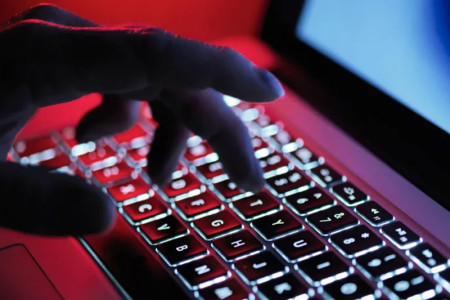The DOJ partnered with the FBI and other international agencies to take down what was "likely the world’s largest botnet ever”.
Chinese national YunHe Wang, who is also a St Kitts and Nevis citizen, has been charged with creating and operating the network.
A botnet is a network of computers which have been infected with malware and are being controlled by a malicious actor.
Mr Wang is charged with conspiracy to commit computer fraud, substantive computer fraud, conspiracy to commit wire fraud and conspiracy to commit money laundering.
If convicted on all counts, he faces a maximum penalty of 65 years in prison.
According to the indictment, between 2014 to 2022, Mr Wang and others created and operated the botnet, called 911 S5, from about 150 servers around the world.
The botnet hacked into more than 19 million Internet Protocol (IP) addresses in almost 200 countries, the DOJ said.
An IP address is a unique code that identifies a device on the internet or network.
The botnet was used to carry out cyber attacks, large-scale fraud, child exploitation, harassment, bomb threats and export violations, the DOJ said.
The US estimated that more than half a million fraudulent unemployment insurance claims had originated from compromised IP addresses, resulting in a loss of more than $5.9bn.
The network also enabled cybercriminals to buy goods with stolen credit cards or launder money, the DOJ said.
Mr Wang allegedly sold access to the IP addresses and received approximately $99m, the DOJ said.
He allegedly bought property in the US, St Kitts and Nevis, China, Singapore, Thailand and the United Arab Emirates.
Assets worth a total of around $60m have been seized or identified for seizure, including a Ferrari, a Rolls-Royce and several watches, the DOJ said.
Law enforcement agencies in Singapore and Thailand, as well technology giant Microsoft, were among the organisations that helped with the investigation.
One of world's biggest botnets taken down, US says
Law enforcement agencies from around the world have shut down a global malware network which stole $5.9bn (£4.65bn) and is linked to other crimes, the US Department of Justice (DOJ) has said.
The DOJ partnered with the FBI and other international agencies to take down what was "likely the world’s largest botnet ever”.
Chinese national YunHe Wang, who is also a St Kitts and Nevis citizen, has been charged with creating and operating the network.
A botnet is a network of computers which have been infected with malware and are being controlled by a malicious actor.
Mr Wang is charged with conspiracy to commit computer fraud, substantive computer fraud, conspiracy to commit wire fraud and conspiracy to commit money laundering.
If convicted on all counts, he faces a maximum penalty of 65 years in prison.
According to the indictment, between 2014 to 2022, Mr Wang and others created and operated the botnet, called 911 S5, from about 150 servers around the world.
The botnet hacked into more than 19 million Internet Protocol (IP) addresses in almost 200 countries, the DOJ said.
An IP address is a unique code that identifies a device on the internet or network.
The botnet was used to carry out cyber attacks, large-scale fraud, child exploitation, harassment, bomb threats and export violations, the DOJ said.
The US estimated that more than half a million fraudulent unemployment insurance claims had originated from compromised IP addresses, resulting in a loss of more than $5.9bn.
The network also enabled cybercriminals to buy goods with stolen credit cards or launder money, the DOJ said.
Mr Wang allegedly sold access to the IP addresses and received approximately $99m, the DOJ said.
He allegedly bought property in the US, St Kitts and Nevis, China, Singapore, Thailand and the United Arab Emirates.
Assets worth a total of around $60m have been seized or identified for seizure, including a Ferrari, a Rolls-Royce and several watches, the DOJ said.
Law enforcement agencies in Singapore and Thailand, as well technology giant Microsoft, were among the organisations that helped with the investigation.
Peter Hoskins


